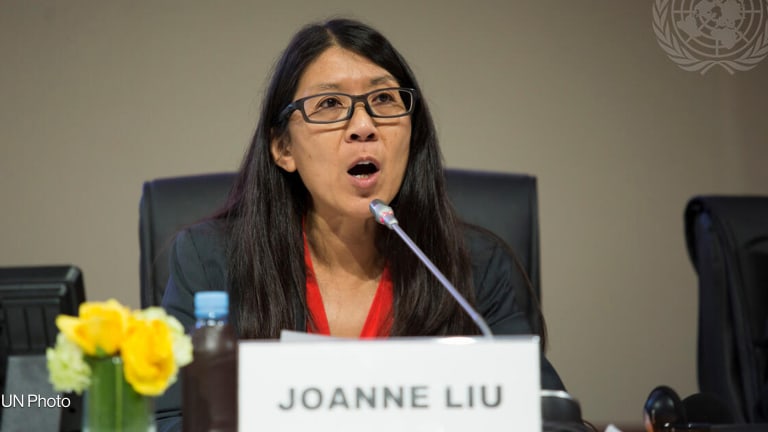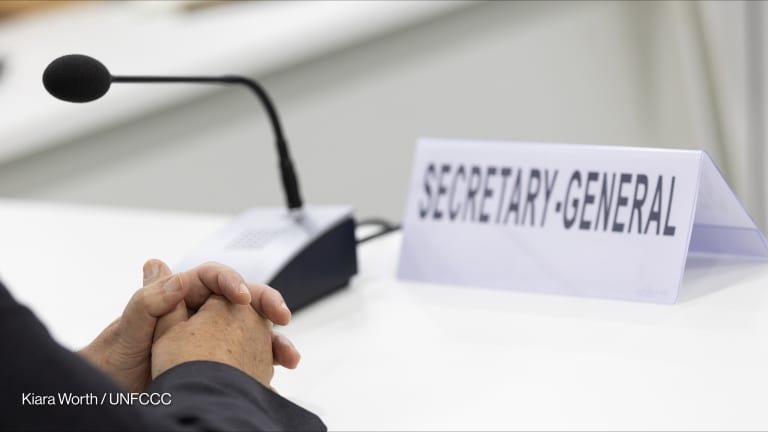UN youth envoy envisions a UN that embraces risk
After two years as the U.N secretary-general's envoy on youth, Jayathma Wickramanayake reflects on how her experience has matched her expectations — and what she thinks needs to change to keep the U.N. relevant.
UNITED NATIONS — Jayathma Wickramanayake, 28, says she remembers observing the first U.N. secretary-general's envoy on youth a few years ago and thinking how glamorous the post must be. “When you look at it from the outside, through social media and different events, you always feel like it's such a fancy job to have. You get all this exposure and there are thousands of young people who are very supportive of you,” Wickramanayake said. “And then, at the same time, you can go and meet a president or prime minister and say, ‘Young people in your country have these problems and what are you doing about it?’ I was quite fascinated by the power and the visibility and the opportunity to meet so many young people who are doing similar work,” she continued. U.N. chief António Guterres appointed Wickramanayake as his second envoy on youth in June 2017, drawing her from the world of civil society into the U.N. system. Wickramanayake likes to say that she has two jobs — by day, she is formally tasked with representing the secretary-general’s office and work to young people, whether in communications strategies or at major development forums, but she also serves as a de facto representative for young people, who routinely approach her with ideas and concerns. Youth have “fluid definition,” Wickramanayake explained, but generally constitutes people aged 15 to 29, for her office’s purposes. “All the member states and leadership talk about youth, but when you look at what is concretely going on, sort of putting money where your mouth is, you don't see a lot of investment.” --— Jayathma Wickramanayake, U.N. secretary-general envoy on youth The reality of working at a senior level in the U.N. — especially as the youngest person in the room — is different from what Wickramanayake imagined, she told Devex in a recent interview in her New York office. One of the big “shocks” was that the youth envoy’s office does not have any allocated funding from the U.N. system. Wickramanayake explained that she spends about half of her time fundraising and has brought in about $1 million for the office so far but that several of her nine staffers are employed by other U.N. agencies, or through fellowships and internships. “All the member states and leadership talk about youth, but when you look at what is concretely going on, sort of putting money where your mouth is, you don't see a lot of investment in it. So that definitely surprised me a lot,” Wickramanayake said. It has also been a challenge to navigate the U.N.’s bureaucratic system, and push for internal reforms such as paying U.N. interns for their work, Wickramanayake said. The World Health Organization passed a resolution to compensate interns last year, and the U.N. Population Fund, the U.N. Children’s Fund, and U.N. Development Programme are also considering paying their interns, according to Wickramanayake. She plans to end her office’s unpaid internship program next year and offer paid fellowships instead. Wickramanayake is pushing for other changes such as encouraging governments to disaggregate demographic data based on age. Available data can sometimes lump people aged 15 to 60 in one group, Wickramanayake said. It can cost millions, though, to add a single question to a demographic survey, she has learned through her conversations with different governments. “A very big challenge that I face is accessing data,” Wickramanayake said. “You really need to go and listen to young people and know what their concerns are if you are to effectively address some of the root causes of the big problems you are talking about.” As part of her office’s youth strategy, Wickramanayake and her team are developing a new Sustainable Development Goals dashboard to track the goals’ implementation, specifically in youth populations. She also convened the first U.N. Youth Climate Summit in September 2019, and offers a young leadership program for 17 people each year. The call for applications can draw more than 15,000 prospective participants, she said. Wickramanayake’s post does come with some level of prestige and influence. Guterres routinely invites Wickramanayake to sit in on high-level meetings with the chief executives board and high-level committee on management — and not to just sit quietly in the room. “It is surprising to see in such a limited environment that, if you have the commitment of leadership, the kind of spaces that you can also have to influence,” Wickramanayake said. “The secretary-general really asks what my opinion is and how I think things should change.” The answer for what needs to change within the U.N. system is lengthy, but involves a reform of outdated workplace practices, Wickramanayake said. She regularly briefs U.N. agency heads on steps they should take to give young employees more opportunity and flexibility. The assumption that age equals experience needs to be rethought, Wickramanayake explained. A 19-year-old, for example, could be the best equipped to fluently and effectively do social media communications, she said. These changes might be necessary in order to retain talent, a recent survey by a U.N. staff network showed. A reported 57.5% of junior staff working for the U.N. said they are considering leaving the organization, and 72% said they would do so in the next two years, according to the 2019 internal survey conducted by Young U.N. “We need to do a lot in terms of changing the organizational culture and attitudes. We tend to avoid risks, but for you to have the most innovative idea in the world, you cannot do it if you avoid risk,” Wickramanayake said. Mobility — horizontal, not just vertical — is a priority for many of the young employees Wickramanayake speaks with. “As young staff, you don't want to just be limited doing the same job for 40 years in your life,” Wickramanayake said. “The problem is when you move out of headquarters, it's almost impossible to come back to headquarters, because there's no roster … or no way for you to be able to have job security and mobility at the same time.” There’s also the issue of promoting a work culture that is honest in its shortcomings. “If you look at annual reports of organizations, you will only see success,” Wickramanayake said. “If we go wrong, then how do we make sure that it doesn't happen again? We need to be able to embrace failure and learn from failure without shoving it under the carpet.”
UNITED NATIONS — Jayathma Wickramanayake, 28, says she remembers observing the first U.N. secretary-general's envoy on youth a few years ago and thinking how glamorous the post must be.
“When you look at it from the outside, through social media and different events, you always feel like it's such a fancy job to have. You get all this exposure and there are thousands of young people who are very supportive of you,” Wickramanayake said.
“And then, at the same time, you can go and meet a president or prime minister and say, ‘Young people in your country have these problems and what are you doing about it?’ I was quite fascinated by the power and the visibility and the opportunity to meet so many young people who are doing similar work,” she continued.
This story is forDevex Promembers
Unlock this story now with a 15-day free trial of Devex Pro.
With a Devex Pro subscription you'll get access to deeper analysis and exclusive insights from our reporters and analysts.
Start my free trialRequest a group subscription Printing articles to share with others is a breach of our terms and conditions and copyright policy. Please use the sharing options on the left side of the article. Devex Pro members may share up to 10 articles per month using the Pro share tool ( ).
Amy Lieberman is the U.N. Correspondent for Devex. She covers the United Nations and reports on global development and politics. Amy previously worked as a freelance reporter, covering the environment, human rights, immigration, and health across the U.S. and in more than 10 countries, including Colombia, Mexico, Nepal, and Cambodia. Her coverage has appeared in the Guardian, the Atlantic, Slate, and the Los Angeles Times. A native New Yorker, Amy received her master’s degree in politics and government from Columbia’s School of Journalism.








